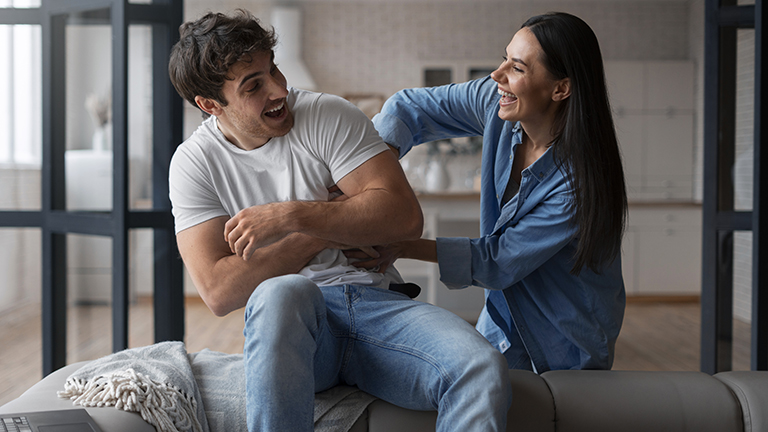Support a Partner with Anxiety: Anxiety is a common mental health condition that affects millions of people worldwide. When your partner is struggling with anxiety, it can impact not only their well-being but also the dynamics of your relationship. Learning how to support a partner with anxiety is essential for building a strong, healthy, and loving relationship. Understanding anxiety, practising effective communication, offering emotional support, and seeking professional help are crucial steps in helping your loved one navigate their challenges while maintaining a strong emotional bond.
Supporting a partner with anxiety involves more than just being present. It requires understanding their triggers, knowing how to communicate effectively, and finding ways to encourage coping mechanisms that do not exacerbate their anxiety. In this article, we explore detailed strategies, expert opinions, and actionable advice on how to help your partner while also taking care of your own mental health.
Understanding Anxiety in Your Partner
Anxiety can manifest in many ways, from constant worry to panic attacks, and understanding your partner’s experience is the first step in providing meaningful support. Each individual experiences anxiety differently, and what works for one person may not work for another. Taking the time to understand their symptoms, triggers, and coping mechanisms can help you create a supportive environment that fosters trust and emotional safety.
Anxious partners may often feel overwhelmed by day-to-day stressors, social interactions, or internal pressures. These feelings are not always visible, so learning to recognise subtle signs of anxiety, such as restlessness, irritability, difficulty sleeping, or withdrawal, can help you respond effectively. Being aware of these behaviours and acknowledging them without judgement can reassure your partner that they are not alone.
Understanding anxiety also involves recognising that it is not a flaw or a reflection of weakness. It is a mental health condition that requires empathy, patience, and consistent support. Educating yourself about anxiety through reputable sources and mental health professionals can enhance your ability to respond to your partner’s needs compassionately.
Effective Communication Strategies for Support a Partner With Anxiety
Communication is the backbone of any healthy relationship, and it becomes even more critical when supporting a partner with anxiety. Effective communication involves listening actively, validating feelings, and avoiding statements that may unintentionally minimise their experiences. Your partner needs to feel heard and understood without fear of judgement or dismissal.
Listening without judgement means giving your full attention, acknowledging their feelings, and refraining from offering immediate solutions unless asked. Sometimes, anxious partners need a safe space to express their emotions without interruption or critique. Simple phrases such as “I understand this is difficult for you” or “I’m here for you” can go a long way in validating their feelings.
[INSERT_ELEMENTOR id=”5108″]
Talking about anxiety without pressure involves creating a calm environment where your partner feels comfortable sharing their thoughts. Encourage open discussions about their experiences, triggers, and coping strategies. Avoid criticising or offering unsolicited advice, as this may increase stress or anxiety. Instead, focus on collaborative problem-solving and mutual understanding.
Practical Ways to Support Your Partner
Supporting your partner with anxiety requires actionable strategies that help them manage their symptoms while maintaining a balanced relationship. Creating a calm and safe environment is one of the most effective ways to reduce anxiety. This may involve minimising stressful situations, offering reassurance during moments of panic, and maintaining consistency in routines and expectations.
Encouraging healthy coping mechanisms, such as mindfulness, exercise, journaling, or relaxation techniques, can empower your partner to manage anxiety proactively. Engaging in these activities together can strengthen your bond while modelling positive behaviours. Avoid relying solely on avoidance or over protectiveness, as these approaches can inadvertently reinforce anxiety.
Being patient and consistent is essential. Recovery and management of anxiety are often gradual processes, and setbacks may occur. Demonstrating patience, offering consistent support, and celebrating small victories can reinforce your partner’s confidence and trust in your relationship.
Supporting Yourself While Supporting Them
Supporting a partner with anxiety can be emotionally demanding, and it is crucial to prioritise your own well-being. Setting healthy boundaries ensures that you are not overwhelmed while still providing care and support. Establishing clear limits around personal space, time, and emotional energy can prevent burnout and maintain a balanced dynamic.
Managing your own stress is equally important. Engaging in self-care practices, seeking social support, or talking to a mental health professional can help you process your emotions and remain resilient. A strong, supported partner is better equipped to provide meaningful support without compromising their own mental health.
Seeking Professional Help Together: Support a Partner With Anxiety
Professional support can play a pivotal role in managing anxiety in a relationship. Couples therapy or counselings can provide a safe and structured environment for discussing anxiety-related challenges. A trained therapist can offer communication techniques, coping strategies, and guidance tailored to both partners’ needs.
Individual therapy may also be beneficial for your partner, allowing them to develop personal coping strategies and gain deeper insight into their anxiety. Encouraging professional help should be done sensitively, emphasising that seeking support is a sign of strength rather than weakness.
Building a Strong, Anxiety-Sensitive Relationship
A relationship that thrives despite anxiety requires intentional effort and understanding. Celebrating small wins, such as successfully managing a panic episode or practising relaxation techniques together, reinforces progress and builds mutual confidence. Maintaining emotional intimacy through shared experiences, honest conversations, and consistent support strengthens the connection between partners.
Trust is fundamental. Being reliable, responsive, and empathetic fosters a sense of security, allowing your partner to feel safe in expressing their fears and emotions. By creating a supportive environment, you nurture a relationship where both partners can grow emotionally and navigate challenges together.
Prevention Tips for Supporting a Partner with Anxiety
Preventing anxiety flare-ups in your relationship does not mean eliminating all stress, but rather creating strategies and habits that reduce triggers, enhance communication, and promote emotional stability. Prevention is about proactive care—both for your partner and for your relationship as a whole.
One key prevention strategy is fostering a predictable and calm environment. Anxiety often intensifies when routines are inconsistent or when unexpected stressors arise. Establishing regular schedules, clear expectations, and shared responsibilities can reduce uncertainty and create a sense of security. Even small routines, such as morning check-ins or nightly wind-down rituals, can help prevent anxiety escalation.
Another prevention method involves proactive communication. Encourage open discussions about feelings, concerns, and potential stressors before they become overwhelming. Regularly asking how your partner is feeling or if they anticipate challenges can help you address issues early. Active listening, validation, and non-judgemental responses serve as preventive measures that strengthen trust and reduce the likelihood of misunderstandings.
Encouraging healthy coping mechanisms is also critical for prevention. Practices like mindfulness, deep breathing exercises, meditation, physical activity, and creative outlets can help your partner manage anxiety before it becomes unmanageable. Participating in these practices together not only reinforces their use but also fosters connection and shared resilience.
Setting and respecting boundaries is another effective preventive approach. Both partners need to know their limits and communicate them clearly. By respecting personal space and avoiding overburdening your partner, you minimise stressors that could trigger anxiety episodes. Boundaries also promote mutual respect and ensure both partners maintain mental and emotional health.
Lifestyle factors play a significant role in preventing anxiety flare-ups. Encouraging adequate sleep, balanced nutrition, and regular exercise supports mental health and reduces susceptibility to stress. Limiting stimulants such as caffeine and alcohol, or avoiding excessive exposure to stressful media, can also contribute to prevention.
Finally, seeking early professional guidance is a powerful preventive measure. Regular check-ins with therapists, counsellors, or support groups provide strategies for coping with anxiety and can address potential issues before they escalate. Preventive care emphasises maintaining emotional well-being rather than reacting to crises.
By implementing these prevention strategies, couples can create a supportive, understanding, and anxiety-sensitive relationship environment. Preventive practices empower both partners to navigate challenges together, reduce stress triggers, and maintain a strong, loving connection over the long term.
Common Mistakes to Avoid
When supporting a partner with anxiety, it is easy to fall into patterns that may unintentionally exacerbate their stress. Minimising their feelings, using dismissive language, or expressing frustration can make them feel isolated and misunderstood. Avoid statements such as “just relax” or “you’re overreacting,” as these can invalidate their experiences.
Overcompensating or enabling avoidance behaviours is another common mistake. While it is natural to want to protect your partner, constantly shielding them from stressful situations may reinforce anxiety rather than reduce it. Encouraging gradual exposure to challenging scenarios, with your support, promotes resilience and confidence.
Final Thoughts: Support a Partner with Anxiety
Supporting a partner with anxiety is a journey that requires patience, empathy, and commitment. By understanding their experiences, communicating effectively, offering practical support, and seeking professional guidance when necessary, you can foster a strong and compassionate relationship. Remember that your own well-being is equally important, and maintaining a balanced dynamic ensures that both partners thrive emotionally.
Anxiety does not have to define a relationship. With awareness, support, and love, couples can navigate anxiety together, building a foundation of trust, resilience, and emotional intimacy. Each step you take in supporting your partner contributes not only to their well-being but also to the health and longevity of your relationship.


